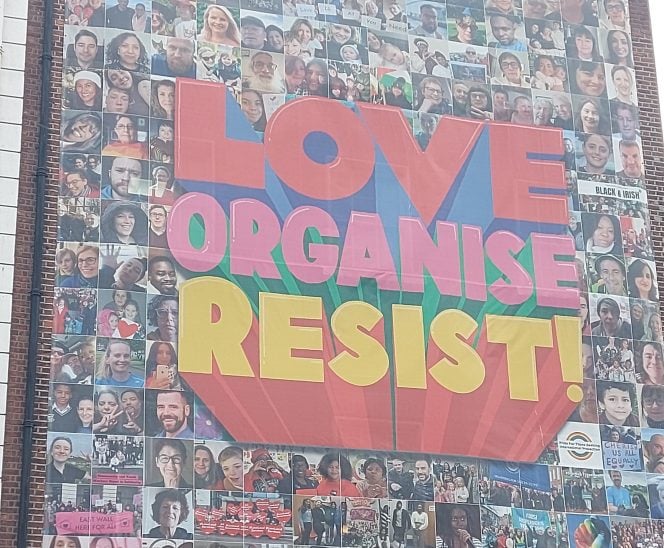'Global Citizenship Education - Planting Seeds of Change'
Contemporary Global Development Issues, Challenges and Responses (KD637) - 10 ECTS, compulsory - Department of International Development.
In this module learners explore contemporary global development issues, challenges and responses with a view to supporting critical engagement with different theoretical perspectives, research and case studies on global development and the complexity of contemporary challenges and responses.
Sharing the World: Education, Pluralism, and Conflict (ED690A)- 5 ECTS, elective - Department of Education.
This module address contemporary issues relating to difference, pluralism, inclusion, and identity. It examines the relationship between education, concepts of pluralism and what it means to share the world. It offers a pedagogical and experiential framework to analyse and unpack injustices and exclusions, alongside skills to engage in difficult conversations. The course introduces a range of creative pedagogical approaches to support educators in exploring and addressing these issues.
Community and Youth Work Practice: Local Issues, Global Lens (CY650) - 5 ECTS, elective - Department of Applied Social Studies.
This module provides learners with an overview of key areas of debate at local and global levels and their implications for the future, seeking to link community and youth work practice in the Global North with issues and outcomes in the Global South. It also examines aspects of development and development education appropriate to youth work and community work contexts and considers the contribution of global citizenship education concepts and practices to these contexts.
Critical Reflective Practice in Global Citizenship Education (AD641) - 5 ECTS, elective - Department of Adult and Community Education
This module provides a space for critical reflection on GCE in the light of insights from theory and practice in the areas of critical pedagogy, community and adult education, and post-critical and decolonial approaches to GCE. Engaging with contemporary understandings and discourses of GCE from critical and post-critical perspectives, it explores the purpose, limits and potential of GCE in the face of contemporary global challenges. Participants from across the education spectrum, including those working in adult, community and further education settings, are supported to critically reflect on their own GCE practice and to develop their skills of engaging groups with GCE ‘otherwise’, i.e., in more challenging, critical and transformative ways.
Decolonising the Curriculum (EDF633) - 5 ECTS, elective - Froebel Department of Primary and Early Childhood Education.
This interdisciplinary elective module supports learners to reflect on complex global issues such as decolonisation, ethnocentrism, stereotyping and the ethics of representation; as well as concepts such as power, privilege and solidarity. Multiple perspectives, including critical race theory, are infused into teaching and learning by drawing on a range of theorists from the Global South, and scholars from other under-represented backgrounds.
TThe Cert in GCE is a one-year (8 months) part time course of study commencing in September. Classes will be timetabled to suit those who are working full-time during regular working hours, i.e., on campus on Saturdays, in the evenings or during holidays, with some online dimensions. See also Frequently Asked Questions (FAQs) below.
Participants who successfully complete the Certificate in Global Citizenship Education at MU have the option of progressing onto a PG Diploma or MA in International Development in MU in a subsequent year and can avail of some exemptions for 20 ECTS credits of coursework completed where there are compatible modules. To do so participants must apply through PAC for a place on the MA or PG Diploma in International Development and complete an Exemptions request form. Please contact the programme co-ordinator, Dr. Tom Campbell, for more details – email: [email protected]
This programme will be offered from September 2024. See https://www.maynoothuniversity.ie/international-development/our-courses/certificate-global-citizenship-education for further details of Entry Requirements and How to Apply and follow the links to the to the PAC (Postgraduate Applications Centre) where you will receive guidance on how to upload your details and apply for a place. Please note there is a non-refundable charge of €50 to apply via PAC so please ensure you have looked at all the information and guidelines before applying. Please note that the closing date for applications is Wednesday 31st July 2024.
Course Fees:
The tuition fees for this certificate programme in 2024 are €1,600. All students also need to pay an additional €150 student levy on registration.
Some partial fee grants are available for primary and post primary teachers and for further and adult educators in 2024 through Global Village, Worldwise Global Schools and Saolta respectively. Details of how to apply for this support will be made available soon. Those eligible to apply for partial fee support from these organisations need to apply first (and be accepted) for a place on the course. Do not contact these organisations until you have been accepted onto the programme. Please contact the programme co-ordinator, Dr. Tom Campbell, for more details – email: [email protected]
Further information on applications and fees can be found under Frequently Asked Questions (FAQs) below.
For enquiries please email us at: [email protected]
Telephone: +353 1 7084626
Re: Applications
What are the entry requirements?
Applicants must have a recognised primary degree, which is considered equivalent to Irish university primary degree level, or relevant experience which can be recognized as equivalent prior learning.
Applicants must demonstrate an interest in or engagement with global education in an education or work context.
How should I apply?
Please apply by completing the application form on the PAC system. To accompany the application form, you will need transcripts of your academic qualifications to date and one reference (academic or work-related).
See https://www.maynoothuniversity.ie/international-development/our-courses/certificate-global-citizenship-education for further details of Entry Requirements and How to Apply. Please note that the closing date for applications is Wednesday 31st July 2024.
When will I know if my application has been successful or not?
Applications are usually processed within three – four weeks.
Fees and Scholarship Information
Fees – how much does the Certificate in Global Citizenship Education cost?
The tuition fees for this certificate programme in 2024 are €1,600. All students also need to pay an additional €150 student levy on registration.
Are there scholarships available for the Certificate programme?
Some partial fee grants are available for primary and post primary teachers and for further and adult educators in 2024 through Global Village, Worldwise Global Schools and Saolta respectively. Details of how to apply for this support will be made available soon. Those eligible to apply for partial fee support from these organisations need to apply first (and be accepted) for a place on the course. Do not contact these organisations until you have been accepted onto the programme. Please contact the programme co-ordinator, Dr. Tom Campbell, for more details – email: [email protected]
When do fees have to be paid?
Fees are paid on registration.
Can I get my tuition fees back if I can’t participate?
Maynooth University regulations apply with regard to the handling of tuition fees for this programme. Please contact the Fees office for further details. https://www.maynoothuniversity.ie/student-fees-grants
Certificate Schedule and Standard
When will classes be held?
Classes will be timetabled to suit those who are working full-time during regular working hours, i.e., on campus on Saturdays, in the evenings or during holidays, with some online dimensions.
Can I participate fully online?
No. To facilitate in-person engagement and participatory, experiential learning, the certificate is designed as an on-campus programme with some blended (a mix of online and on campus) or online dimensions.
Is there a lot of work involved?
This is a 20 credit (ECTS) certificate at level 9. Participants will usually undertake one 10 ECTS compulsory module in the first semester and two 5 ECTS elective modules in the second semester. Each module will involve approx. 24 hours of face-to-face engagement with additional hours of self-directed or group learning activities. These include assessments, reading, reflection, writing and group work. Each credit in the ECTS equates to approx. 25 hours of student effort. The time involved varies per person and the amount of work you want to put into it, but it is generally expected that 20 credits over a year would be approx. 12 hours a week over 33 weeks, i.e., from beginning of Sept to end of April. That includes class contact time (approx. 24 hours per module). Though this requires significant work to complete over one year, it is designed as a 20 ECTS certificate to facilitate participation by those who are engaged in full-time or part-time work and other commitments for much of their time.
Instead of taking all the modules in one year, can I do the course over 2 years?
Unfortunately, this is not possible at the present time. All modules must be completed within one academic year.
If something unforeseen arises, can I defer my place on the programme to next year?
In certain circumstances, it is possible to defer your place on programme for another year. This depends on the stage at which you wish to defer, e.g., if the programme has started or not or if you have paid tuition fees or not. Please contact the programme co-ordinator for more details – Dr. Tom Campbell – email: [email protected]
Can I sign up for just one or two modules?
This is not possible as this certificate is designed as a 20-ECTS programme to meet the specialist learning needs of practitioners in global citizenship education.
Is there a minimum attendance requirement?
Yes. Apart from exceptional circumstances (including certified illness or bereavement), participants are required to participate in 80% of in-class learning engagement.
What standard of English is required?
Please visit Maynooth University International Office website for information about English language tests accepted and required scores. The requirements specified are applicable for both EU and non- EU applicants.
Certificate Content and Progression
What content will the certificate cover?
This certificate programme will support participants to develop their knowledge, understanding and skills in the area of global citizenship education. As such, participants will learn more about contemporary global development challenges (and what can be done about them), about what’s involved in global citizenship, and about how to engage learners in making local-global connections in relation to the challenging issues of our time. Participants will undertake on compulsory 10-ECTS module, Contemporary Global Development Issues, Challenges and Responses’. In this module learners will explore contemporary global development issues, challenges and responses with a view to supporting critical engagement with different theoretical perspectives, research and case studies on global development and the complexity of contemporary challenges and responses. Full details on the content of the module can be found on MU Course Finder https://www.maynoothuniversity.ie/study-maynooth/postgraduate-studies/courses/certificate-global-citizenship-education
Participants will choose two 5-ECTS modules from the following selection, the details of which are also on MU Course Finder.
- Sharing the World: Education, Pluralism, and Conflict
- Community and Youth Work Practice: Local Issues, Global Lens
- Critical Reflective Practice in Global Citizenship Education
- Decolonising the Curriculum
[Please note that each module requires a minimum of 12 participants to ensure it will be running]
What is the assessment like?
The assessment for this programme is designed to support learning, reflection on practice and the connection between theory, reading and practice. As such, it will be continuous assessment, and involve a range of different assessment types. These include essays, reflections, presentations, group work and minor projects. There will be no sit-down exams.
Is there a reading list that we can consult ahead of time?
While there is no specific required reading in advance, you may wish to consult the following journals and websites which offer an extensive range of resources and academic peer-reviewed articles in areas related to global citizenship education.
The Bridge 47 Resources Library - https://www.bridge47.org/resources
Developmenteducation.ie website of resources on global citizenship education - https://developmenteducation.ie/
Journal of Transformative Education - https://journals.sagepub.com/home/jtd
International Journal of Development Education and Global Learning - https://www.uclpress.co.uk/pages/international-journal-of-development-education-and-global-learning
Policy and Practice: A Development Education Review - https://www.developmenteducationreview.com/
The Irish Development Education Association, IDEA, is the national network for Development Education in Ireland – www.ideaonline.ie
Will this course allow me to progress onto a Masters?
Participants who successfully complete the Certificate in Global Citizenship Education at MU have the option of progressing onto a PG Diploma or MA in International Development in MU in a subsequent year and can avail of some exemptions for 20 ECTS credits of coursework completed where there are compatible modules. To do so participants must apply through PAC for a place on the MA or PG Diploma in International Development and complete an Exemptions request form. Please contact the programme co-ordinator, Dr. Tom Campbell, for more details – email: [email protected]
Elaine Mahon - PG Cert. in Global Citizenship Education participant
Cliodhna Malone - PG Cert. in Global Citizenship Education participant
The postgraduate certificate in Global Citizenship Education completed with the Maynooth University Department of International Development has allowed me to explore a variety of new approaches to education as both a learner and facilitator. This course utilised the expertise of five different departments in Maynooth University.
Various styles of learning and facilitating were used and all concentrated on understanding, critical reflection, and participatory methods for learning. We had a few brilliant guest lecturers and speakers, as well as a module that was shared with some of the MA students in Maynooth.
This course has helped me to come full-circle in my ‘development’ journey where I now have the tools to engage and facilitate global citizenship education for both young people and adults in a voluntary or professional capacity.
I could be slightly biased but I would definitely recommend this part-time course to those interested in global issues and active citizenship.



